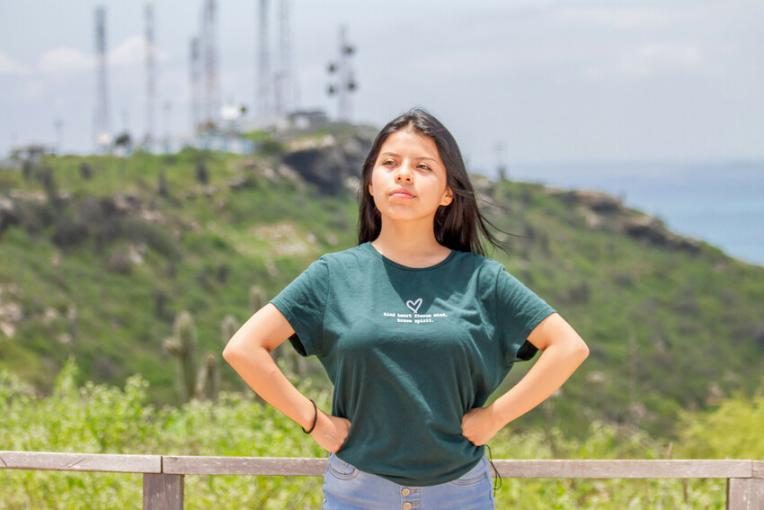21 JULY 2021
In a new survey released today, young people have told us clearly that they are fearful for their future and want to shape the policies and decisions that will define them.

Eight out of 10 young people (82%) say they know nothing, very little or only a bit about their country’s climate policy, according to new research by Plan International.
In a survey of more than 1,800 adolescents and youth from 37 countries, nearly half (44%) did not know what the Paris Agreement is, exposing “significant shortfalls” in how governments educate young people about environmental issues, campaigners say.
Concerns over climate change
This is despite nearly all (98%) of those interviewed, all aged between 15 and 24 , being concerned about the climate emergency. Of these, three quarters (74%) say they feel very or extremely worried.
Girls and young women are more likely to worry about climate change, with 99% saying they are concerned about it, compared to 95% of boys and young men.
Almost nine in ten (86%) young people whose views are published in the report Reimagining climate education and youth leadership, have taken action because of their fears.
The most common form of action was educating peers or family about climate issues (64%), signing or sharing a petition (49%) and posting about climate change on social media (45%).
Just under one in five (18%) had joined a protest or strike.
Girls were more likely to act on their concerns, with 88% engaging in at least one form of action, compared to 82% of boys.
Governments must listen to young people on climate emergency
But despite this, fewer than one in ten (6%) have participated in climate policy processes such as the COP UN Climate Change Conference. The UK government is hosting the COP26 summit in November, a key opportunity to meaningfully engage and listen to young people.
An overwhelming majority (84%) of survey participants say their government’s efforts to include them in policies to tackle the climate emergency is insufficient, while only 6% think they are about right.
Most say their teaching at school has focused on the impacts of climate change (90%) and individual actions such as recycling, saving energy and changing diets (73%), but told Plan International that this often isn’t relevant to their day to day lives.
Only 22% have been taught about climate policies and frameworks, and only 11% have been taught how to participate in climate decision making processes.
About one in five (18%) rated their climate change education as poor or very poor.
Young people speak out on climate education
One teenage girl from Australia who took part in the research, said “Very little was taught about climate change at my school, it was not in depth and it was just mentioned. We had to educate ourselves if we were curious enough.”
A young man from the UK, said “Climate change in school was ‘done to death’! But not in a way that was relevant or engaging, just that it was happening, more of a tick box than an actual education on the issues and what to do.”
Of the young people surveyed, 81% did not know where to find information on the Paris Agreement, the most recent legally binding international treaty on climate change, with a goal of limiting global warming to well below two degrees Celsius compared to pre-industrial levels.
- Only 8% can name at least one of the agreement’s key articles, and only 7% know about current negotiation processes, such as COP.
- Girls and young women were more likely to say they don’t feel confident participating in climate policy processes (29%), compared to boys and young men (20%).
- Nine in ten (92%) of those interviewed were either currently pursuing or have already completed secondary or university education.
Young people are fearful for their future
Jessica Cooke, Climate Change Policy and Advocacy Adviser at Plan International, said “The climate crisis is without a doubt the defining issue of our time, and it is young people who will bear the brunt of its impacts and live with them the longest. As in most emergencies, girls and young women are likely to suffer the most devastating consequences. This year alone, it is estimated that climate change will prevent at least four million girls from completing their education.”
“Young people have told us clearly that they are fearful for their future and want to shape the policies and decisions that will define them, but don’t feel informed or empowered enough to do so. This exposes significant shortfalls in how governments are teaching children and girls about the environmental crisis we face.”
“This needs to change, governments worldwide must give young people, including and especially girls in their diversity, a greater say in how to tackle the climate emergency. This should start with better education in schools, giving pupils the confidence and skills to engage with its social and political dimensions, and support in advancing climate and gender justice.”
Young people have told us clearly that they are fearful for their future and want to shape the policies and decisions that will define them
Ahead of the Global Partnership for Education (GPE) Replenishment summit and COP26 conference this year, Plan International is calling on governments worldwide to improve school teaching on the climate emergency, including placing greater emphasis on the social, political and human rights dimensions of the crisis.
Alongside youth charity Transform Education, we are campaigning for better education about climate policy processes, including the different policies that exist, and how young people can engage in decision making processes and hold power holders to account.
We are also calling for more funding for girls’ education in the most climate exposed countries, including an ask for $5 billion at the GPE summit and through the Green Climate Fund.


